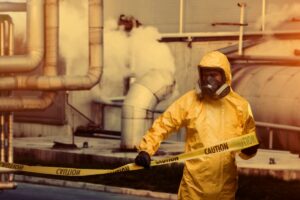Chemical Exposure Claims in New York

Common Types of Toxic Chemical Exposure
There are countless ways in which workers may be exposed to chemical substances. Many types of chemical exposure occur in manufacturing, construction, mining, and industrial settings. However, anyone can suffer injury or occupational disease if they’re exposed to environments with harsh cleaning chemicals and other substances if their work area is not well-ventilated. Some common substances that can cause harm include lead, asbestos, benzene, mercury, cadmium, beryllium, mercury, silica, acids, paint, solvents, pesticides, and cleaning products.
Whether someone suffers injuries due to chemicals through inhalation, contact with the skin or eyes, or by ingesting it, the results can be devastating. If you were harmed by chemical exposure at work, employer negligence may play a part if your employer failed to follow proper safety protocol or provide adequate PPE and ventilation. Our occupational disease lawyers can assess your case and advise you of your options.
Occupational Illnesses and Injuries Caused by Chemical Exposure
There are a number of injuries and diseases that can be caused by chemical exposure, including
Asbestosis – This chronic lung disease is caused by inhaling asbestos fibers. Symptoms can range from mild to severe, and usually don't appear until many years after initial exposure.
Mesothelioma – This rare cancer is also caused by asbestos exposure.
Other lung and respiratory illnesses – Inhalation of hazardous fumes and substances can cause all types of respiratory illnesses, including cancer, asthma, black lung, popcorn lung, and burns or damage to the lungs.
Leukemia – Exposure to certain carcinogens such as ethylene oxide, benzene, and formaldehyde is associated with an increased risk of leukemia.
Non-Hodgkin’s lymphoma – Glyphosate, the active ingredient in the weed killer Roundup, has been known to increase the risk of Non-Hodgkin’s lymphoma.
Acute myeloid leukemia – Oil and gas refining, petrochemical production, tire manufacturing, and other industries expose workers to benzene, which has been linked to other types of cancers as well, such as multiple myeloma, acute lymphocytic leukemia, chronic lymphocytic leukemia, and non-Hodgkin lymphoma.
Other cancers – Kidney, liver, bladder, and other types of cancer can be caused by prolonged exposure to dangerous chemicals at work.
Burns and rashes – Direct contact with harmful chemicals can cause immediate injuries, such as burns or rashes on the skin. Chemicals can also burn the eyes and cause serious damage or blindness.
Neurological issues – Over time, exposure to chemicals can also cause damage to the brain and neurologic functions. Neurotoxicity can be caused by exposure to radiation, lead, mercury, pesticides, cleaning solvents, and other substances.
Workers’ Compensation Claims
If you suffer a chemical exposure injury on the job, you may be entitled to workers' compensation benefits in New York, but it’s important to take certain steps to protect your rights.
Report chemical exposure to a supervisor or employer as soon as possible
Be detailed about how the exposure occurred
Get the names and contact information of anyone who witnessed the exposure
Seek medical treatment
Document your symptoms and when they started to help connect your health issues with the chemical exposure
Make sure to tell your healthcare provider that you were exposed to a toxic chemical and how it occurred. If your claim is denied, it is important to contact an attorney with experience fighting insurance carriers. We understand how to gather evidence and put it all together to show that there is a link between your illness or injury and chemical exposure at work.
Social Security Disability Insurance
If you qualify for workers’ compensation benefits, you may also qualify for Social Security Disability Insurance (SSD) benefits. If you qualify for SSDI and plan to file for both workers’ compensation and disability benefits, it is critical to seek the assistance of an experienced workers’ compensation or disability attorney in New York. Although they are separate programs, when you collect both, things can become complicated. An occupational disease lawyer can help to ensure you’re maximizing the benefits to which you may be entitled.
Chemical Exposure Injury Claims
Workers’ compensation only provides coverage for things like the cost of medical bills and wage loss. In most cases, if you get workers’ compensation benefits you may not sue your employer in New York.
However, if a third party such as a chemical manufacturer caused you harm, you may be entitled to bring a personal injury action.
Proving fault and tying toxic chemical exposure at work to an illness or injury can be challenging. Many of the symptoms related to chemical exposure are also associated with other common medical conditions. Our workers’ compensation lawyers thoroughly evaluate your case and provide straightforward advice about your options for recovering compensation. Our attorney Roland Cubela is a fluent Spanish speaker who is happy to assist multi-lingual clients.
Contact Our Occupational Disease Lawyers in New York
If you or a loved one has been harmed due to chemical exposure at work, our team at Nappa, Monterosso & Poznansky, LLP can take some of the weight off your shoulders and help you obtain the benefits and compensation you deserve. To schedule a case evaluation for your workers’ compensation or Social Security Disability claim, call us at 718-273-9000 or contact us online.
